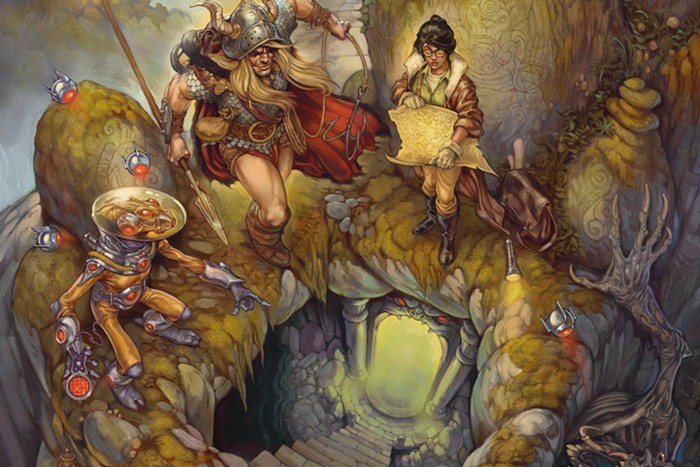Born on America's 28th birthday, Nathaniel Hawthorne is the patron saint of America's sadder half. His stories don't have the unbearable lightness of French ennui, nor the lugubriousness of Russian pessimism. They are afflicted with the special depression of the New World, a depression born of thwarted ambition, imprisoned passion, and soured hope.
He knew the wilderness was dark and scary, full of thorns, beasts, and savages. He knew the town was dark and scary, full of thieves, preachers, and even more savages. He knew how desperately we want to be good and how catastrophically we fail. He knew that God had created the New World for our manifest destiny and that our destiny was going to be painful. He knew what evil lurks in the hearts of men. Nathaniel Hawthorne was writing the blues.
For some reason, it's easier to find this uniquely American sadness in musicians: Ma Rainey, Robert Johnson, John Fahey. Along with Hawthorne, Herman Melville is one of the other few writers who got it—Melville, of course, dedicated Moby-Dick to his gloomy friend and nicknamed him "Mr. Noble Melancholy." Edgar Allan Poe was also a gloomy motherfucker, but he didn't have Hawthorne's bluesy depth. Emily Dickinson, the Bummer of Amherst, did. America has its happy jokers: James Thurber, Walt Whitman. But this is an argument for another time.
The point is, Rebecca Brown gets it, too—not just bluesy American sadness, but Mr. Noble Melancholy himself. Her new collection of essays, American Romances, is riddled with Hawthorne.
The first story, titled "Hawthorne" (originally published in The Stranger as "Unlucky Old Sons"), compares and entangles the lives of Nathaniel Hawthorne and Brian Wilson of the Beach Boys, who grew up in Hawthorne, California: "Hawthorne, writer from the east, and Hawthorne, suburb in the west, are twisted in a Möbius strip: the child and its evil twin, the maker and its son. The City on the Hill became the suburb in the sand." The final essay is a wry gloss on "Young Goodman Brown" and an oblique, poetic recapitulation of everything discussed in American Romances: from sex and rock 'n' roll to Jesus Christ and The Man Who Shot Liberty Valance.
Even when Brown isn't explicitly writing about Hawthorne, his long, deep moans drift through her essays. But, like the blues, they're moans of pleasure and of pain, passing from Hawthorne to Brown to us—breaths intermingling, ideas tangling in unlikely combinations and positions; they can be thrilling and surprising, leaving you in a state of blissful exhaustion.
I know it sounds like I'm (a) being hyperbolic, (b) torturing the metaphor, and (c) singing the obligatory hosannas because Brown once won a Stranger Genius Award. But the essays in American Romances—almost all of them, anyway—really are that good. Brown's voice sounds more relaxed, more confident, than ever before. Her new stories fold history, theory, memory, and outright lies into rich, articulate essays that stretch the boundaries of your brain.
"The Priests," for example, begins as sexually charged memoir—Brown as a child kneeling in front of another little girl, waiting to be fed a cookie. They're playing priest. The other little girl is a bit of a sadist. "Sometimes she'd pick the sidewalk for the altar," Brown writes. "If I was wearing sneakers this wasn't so bad, but if I was in flip-flops or sandals, the street felt awful, although I liked those feelings some."
The essay gets kinkier, following dozens of digressions from childhood heresies (they wondered if John the Apostle, who was always hanging out with the women, was gay) to the history of the Cathars, also known as the Albigensians:
In any event, for Cathars the worst thing in the world, the temptation you really had to watch out for, was procreative sex. It not only brought two bodies together, it could also lead to the creation of another evil, sinful, carnal, beautiful body... In addition to renouncing heterosexual marriage and procreation, the Albigensians also forbade the eating of any form or product of the flesh, even in the symbolic form of wine-as-blood and wafer-as-flesh.
The church declared a crusade on the vegetarian "buggers" (so-called because they possibly came from Bulgaria): "Villagers were dragged from horses, hatcheted, mutilated, used for target practice, fired from their teaching jobs, waterboarded, and given electroshock treatment." Then Alice B. Toklas is the keeper of the recipe for some secret Cathar cookie, named as a series of interlocking puns by Gertrude Stein: "From the Latin or meaning gold, re meaning King, and o meaning oh. Starting and ending with 'O' the omega, the beginning as/is the end, the completion of the whole, the roundness of the world, the lifted belly, the shape of the mouth in ecstasy, whether erotic or cuisinic..." And so on.
American Romances has a total of 44 endnotes, some of them pages long. They don't feel at all academic or precious, just a necessary tool for a brain as restless as Rebecca Brown's. She has things to say about Susan Sontag, Christian summer camps, long-legged surfer girls, duck hunting in Spain, Radclyffe Hall, Felix Mendelssohn, Invisible Man (by Ralph Ellison), The Invisible Man (by H. G. Wells), and The Invisible Man (by James Whale)—and, of course, about the long, gloomy shadow of Mr. Noble Melancholy, stretching from the sands of Salem, Massachusetts, to the sun-bleached boys of California. ![]()



















